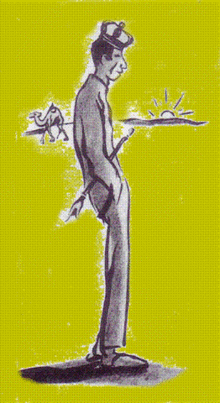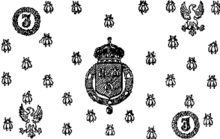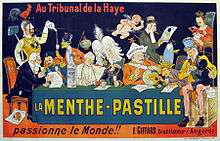Jacques Lebaudy

Jacques Lebaudy (1868 - January 11, 1919) was a Frenchman from a wealthy family of sugar refiners known for his eccentricity and his attempt to establish a new nation, the Empire of the Sahara. The circumstances of his death in 1919 in Westbury, Long Island, resulted in a sensational grand jury proceeding.
Family and early life
Born in 1868, Jacques Lebaudy was the youngest son of Jules Lebaudy (1828-1892), who with his brother Gustave (1827-1889) owned the family sugar refining business, Lebaudy Frères. Jules also owned property in Paris, including the Théâtre du Vaudeville. Jacques' mother Amicie (1847-1917) founded a charity to provide low-cost housing to the working poor which is still in existence.[1] The death of Jacques' younger brother Max (1873-1895) in a military hospital in 1895 after being called up for military service despite a serious illness caused a scandal in France. Lebaudy had inherited about $15 million on the death of his father.
Jacques' cousins Paul and Pierre Lebaudy were notable builders of airships, such as La République.
The Empire of the Sahara

In June 1903, Lebaudy sailed with his yacht Frasquita and two other boats to an area near Cape Juby on the Moroccan coast and proclaimed the "Empire of the Sahara". Backed by as many as 400 hired soldiers and sixteen Hotchkiss guns,[2] Lebaudy established a camp and set up a throne for himself in a large tent. He had various projects for ruling and improving his new domain, but European governments disapproved of his venture, and some of his mercenaries were captured by local Moorish bandits. (They later sued Lebaudy for damages for abandoning them, after being rescued by a French warship.[3]) By October 1903 Lebaudy was installed at the Savoy Hotel in London, and soon installed his government there, appointing American adventurer George Edward Gouraud as his "Governor-General".[4][5] Reportedly the orchestra in the Savoy restaurant would play his national anthem whenever he entered to dine under his imperial purple canopy.[6] After several years the embarrassed French government issued a warrant for his arrest and Lebaudy left North Africa for good.
United States
About 1908 Lebaudy moved to the United States with his wife Augustine and daughter Jacqueline, residing mostly in expensive New York City hotels, and his behavior became more erratic. In 1915 he was placed in an asylum at the request of his wife; he at first fled the local sheriff on horseback, and then escaped for a day.[7] Released from the asylum, Lebaudy reportedly tried several times to have his wife and daughter killed, and was finally killed by his wife on January 12, 1919 at her home in Westbury. A grand jury refused to indict.[8] He left a large estate, having inherited additional portions of the family money from his brother Max and his mother. He also had the reputation, despite his mental problems, of being at times a shrewd investor in stocks and property; he reportedly made a profit of over $1,000,000 in the stock of the Erie Railroad in 1907 when it became the subject of a takeover.
In popular culture

Lebaudy was the subject of wide public interest, first in France and then worldwide. Caricatures of him include that by Sem above and the 1904 poster of world political figures by Eugène Ogé to the right. He was the subject of several lampoons in London publications by the young P. G. Wodehouse.[9][10] The Romance of Terence O’Rourke, Gentleman Adventurer by Louis Joseph Vance, a pulp novel from 1907 probably based on magazine stories published in 1904, is a romanticized version of the "Empire of the Sahara", with Terence O'Rourke being an American adventurer who is recruited to help a cowardly French millionaire become the "Emperor of the Sahara".[11] Another work on Lebaudy was English artist John Copley's 1909 collection of lithographs "The Fall and Rise of His Imperial Majesty Jacques Démodé".[12] The adventures of Lebaudy even inspired a French game-maker to produce a wire puzzle in his honor.[13]
References
- Philippe Di Folco, L'Empereur du Sahara, illustrated biography, Galaade éditions, Paris 2014, ISBN 978-2-35176-251-6
Notes
- ↑ Fondation de Madame Jules Lebaudy
- ↑ Current Literature, October 1903, p. 412-3
- ↑ "Empire Building" in Occasional, Critical, and Political Writings, James Joyce, Oxford University Press, 2000, p. 100 - 101
- ↑ "Emperor of the Sahara", Oamaru Mail, 28 January 1904, Page 4
- ↑ Note: George Gouraud was not closely related to Henri Gouraud, a French officer active at that time in West Africa.
- ↑ The Independent, 15 September 1998, "The Emperor of the Sahara", Bennett Maxwell
- ↑ New York Times, "Sahara's 'Emperor' Flees Sanitarium", Aug. 20, 1915
- ↑ "Clear Mrs. Lebaudy of Killing Husband", New York Times, January 22, 1919
- ↑ A Poem by Wodehouse concerning Lebaudy
- ↑ Another Wodehouse lampoon
- ↑ Review of The Romance of Terence O'Rourke, Gentleman Adventurer
- ↑ Catalog entry for the book at the Yale University Library
- ↑ Blog on old games with photos of "La Croix du Sahara".